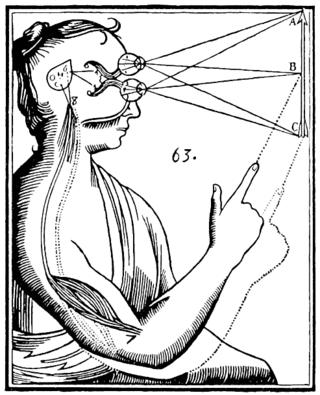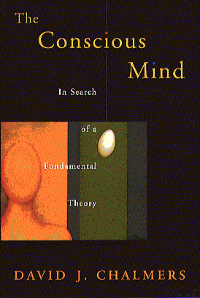Epiphenomenalism is a position on the mind–body problem which holds that subjective mental events are completely dependent for their existence on corresponding physical and biochemical events within the human body, yet themselves have no influence over physical events. The appearance that subjective mental states influence physical events is merely an illusion, consciousness being a by-product of physical states of the world. For instance, fear seems to make the heart beat faster, but according to epiphenomenalism the biochemical secretions of the brain and nervous system —not the experience of fear—is what raises the heartbeat. Because mental events are a kind of overflow that cannot cause anything physical, yet have non-physical properties, epiphenomenalism is viewed as a form of property dualism.
In philosophy, physicalism is the metaphysical thesis that "everything is physical", that there is "nothing over and above" the physical, or that everything supervenes on the physical. Physicalism is a form of ontological monism—a "one substance" view of the nature of reality as opposed to a "two-substance" or "many-substance" (pluralism) view. Both the definition of "physical" and the meaning of physicalism have been debated.

Free will is the notional capacity or ability to choose between different possible courses of action unimpeded.

In the philosophy of mind, mind–body dualism denotes either the view that mental phenomena are non-physical, or that the mind and body are distinct and separable. Thus, it encompasses a set of views about the relationship between mind and matter, as well as between subject and object, and is contrasted with other positions, such as physicalism and enactivism, in the mind–body problem.
Intentionality is the power of minds to be about something: to represent or to stand for things, properties and states of affairs. Intentionality is primarily ascribed to mental states, like perceptions, beliefs or desires, which is why it has been regarded as the characteristic mark of the mental by many philosophers. A central issue for theories of intentionality has been the problem of intentional inexistence: to determine the ontological status of the entities which are the objects of intentional states.
In the philosophy of mind, functionalism is the thesis that each and every mental state is constituted solely by its functional role, which means its causal relation to other mental states, sensory inputs, and behavioral outputs. Functionalism developed largely as an alternative to the identity theory of mind and behaviorism.
In philosophy, an action is an event that an agent performs for a purpose, that is, guided by the person's intention. The first question in the philosophy of action is to determine how actions differ from other forms of behavior, like involuntary reflexes. According to Ludwig Wittgenstein, it involves discovering "[w]hat is left over if I subtract the fact that my arm goes up from the fact that I raise my arm". There is broad agreement that the answer to this question has to do with the agent's intentions. So driving a car is an action since the agent intends to do so, but sneezing is a mere behavior since it happens independent of the agent's intention. The dominant theory of the relation between the intention and the behavior is causalism: driving the car is an action because it is caused by the agent's intention to do so. On this view, actions are distinguished from other events by their causal history. Causalist theories include Donald Davidson's account, which defines actions as bodily movements caused by intentions in the right way, and volitionalist theories, according to which volitions form a core aspect of actions. Non-causalist theories, on the other hand, often see intentions not as the action's cause but as a constituent of it.

In philosophy, supervenience refers to a relation between sets of properties or sets of facts. X is said to supervene on Y if and only if some difference in Y is necessary for any difference in X to be possible.
In logic and philosophy, a property is a characteristic of an object; a red object is said to have the property of redness. The property may be considered a form of object in its own right, able to possess other properties. A property, however, differs from individual objects in that it may be instantiated, and often in more than one object. It differs from the logical/mathematical concept of class by not having any concept of extensionality, and from the philosophical concept of class in that a property is considered to be distinct from the objects which possess it. Understanding how different individual entities can in some sense have some of the same properties is the basis of the problem of universals.
A mental state, or a mental property, is a state of mind of a person. Mental states comprise a diverse class, including perception, pain/pleasure experience, belief, desire, intention, emotion, and memory. There is controversy concerning the exact definition of the term. According to epistemic approaches, the essential mark of mental states is that their subject has privileged epistemic access while others can only infer their existence from outward signs. Consciousness-based approaches hold that all mental states are either conscious themselves or stand in the right relation to conscious states. Intentionality-based approaches, on the other hand, see the power of minds to refer to objects and represent the world as the mark of the mental. According to functionalist approaches, mental states are defined in terms of their role in the causal network independent of their intrinsic properties. Some philosophers deny all the aforementioned approaches by holding that the term "mental" refers to a cluster of loosely related ideas without an underlying unifying feature shared by all. Various overlapping classifications of mental states have been proposed. Important distinctions group mental phenomena together according to whether they are sensory, propositional, intentional, conscious or occurrent. Sensory states involve sense impressions like visual perceptions or bodily pains. Propositional attitudes, like beliefs and desires, are relations a subject has to a proposition. The characteristic of intentional states is that they refer to or are about objects or states of affairs. Conscious states are part of the phenomenal experience while occurrent states are causally efficacious within the owner's mind, with or without consciousness. An influential classification of mental states is due to Franz Brentano, who argues that there are only three basic kinds: presentations, judgments, and phenomena of love and hate.

Property dualism describes a category of positions in the philosophy of mind which hold that, although the world is composed of just one kind of substance—the physical kind—there exist two distinct kinds of properties: physical properties and mental properties. In other words, it is the view that at least some non-physical, mental properties exist in, or naturally supervene upon, certain physical substances.
Jaegwon Kim was a Korean-American philosopher. At the time of his death, Kim was an emeritus professor of philosophy at Brown University. He also taught at several other leading American universities during his lifetime, including the University of Michigan, Cornell University, the University of Notre Dame, Johns Hopkins University, and Swarthmore College. He is best known for his work on mental causation, the mind-body problem and the metaphysics of supervenience and events. Key themes in his work include: a rejection of Cartesian metaphysics, the limitations of strict psychophysical identity, supervenience, and the individuation of events. Kim's work on these and other contemporary metaphysical and epistemological issues is well represented by the papers collected in Supervenience and Mind: Selected Philosophical Essays (1993).
This glossary of philosophy is a list of definitions of terms and concepts relevant to philosophy and related disciplines, including logic, ethics, and theology.
Physical causal closure is a metaphysical theory about the nature of causation in the physical realm with significant ramifications in the study of metaphysics and the mind. In a strongly stated version, physical causal closure says that "all physical states have pure physical causes" — Jaegwon Kim, or that "physical effects have only physical causes" — Agustin Vincente, p. 150.
Anomalous monism is a philosophical thesis about the mind–body relationship. It was first proposed by Donald Davidson in his 1970 paper "Mental Events". The theory is twofold and states that mental events are identical with physical events, and that the mental is anomalous, i.e. under their mental descriptions, relationships between these mental events are not describable by strict physical laws. Hence, Davidson proposes an identity theory of mind without the reductive bridge laws associated with the type-identity theory. Since the publication of his paper, Davidson refined his thesis and both critics and supporters of anomalous monism have come up with their own characterizations of the thesis, many of which appear to differ from Davidson's.
The problem of mental causation is a conceptual issue in the philosophy of mind. That problem, in short, is how to account for the common-sense idea that intentional thoughts or intentional mental states are causes of intentional actions. The problem divides into several distinct sub-problems, including the problem of causal exclusion, the problem of anomalism, and the problem of externalism. However, the sub-problem which has attracted most attention in the philosophical literature is arguably the exclusion problem.
Philosophy of mind is a branch of philosophy that deals with the nature of the mind and its relation to the body and the external world.

The Conscious Mind: In Search of a Fundamental Theory was published in 1996, and is the first book written by David Chalmers, an Australian philosopher specialising in philosophy of mind. Although the book has been greatly influential, Chalmers maintains that it is "far from perfect", as most of it was written as part of his PhD dissertation after "studying philosophy for only four years".
Interactionism or interactionist dualism is the theory in the philosophy of mind which holds that matter and mind are two distinct and independent substances that exert causal effects on one another. An example of your mind influencing your body would be if you are depressed, you can observe the effects on your body, such as a slouched posture, a lackluster smile, etc. Another example, this time of your body affecting your mind would be: If you struck your toe very forcefully on a door, you would experience terrible pain. Interactionism is one type of dualism, traditionally a type of substance dualism though more recently also sometimes a form of property dualism. Many philosophers and scientists have responded to this theory with arguments both supporting and opposing its relevance to life and whether the theory corresponds to reality.
In philosophy, downward causation is a causal relationship from higher levels of a system to lower-level parts of that system: for example, mental events acting to cause physical events. The term was originally coined in 1974 by the philosopher and social scientist Donald T. Campbell.




